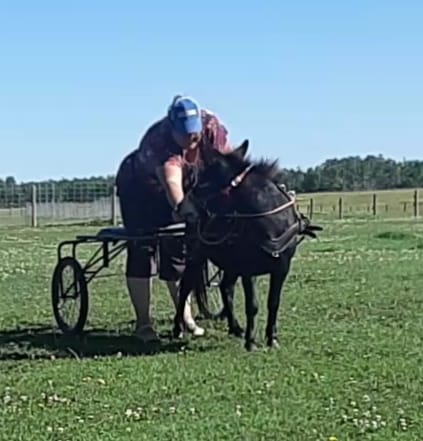Humans are so goal oriented. And we KNOW what the goal is, so we keep working towards it.
Horses are willing and generally want to do what is asked of them – as long as they can figure out what the heck that is!
Here’s an example of how our focus on the outcome can lead to confusion for the horse:
We want to teach our horse to back up. We push on the halter, and the horse takes a step back. “Yay,” we think, “it’s working!” so we keep pushing on the halter.
The horse thinks, well crap, I tried backing up but she just kept pushing on me so that must not be the right answer. Maybe I’ll try going sideways instead.
“Oh no!” you think, and keep pushing, trying to get them to go back straight.
The horse tries to come up with something else to offer, only this time you might now like it so much – maybe they brace and just start pushing back at you. Or maybe they even rear or lunge into you.
Imagine that a different way. You give a cue to back, the horse takes a step back, and you stop the cue, praise, maybe even give them a treat. They KNOW that was the answer you are looking for, so next time you ask, they take a step back with confidence. Again you stop and make sure they know it was right. You ask again, and this time they offer more steps back.
The horse knows what you want, so they are keen, engaged and happy to give the answer that they know is the one you’re looking for.
That’s a pretty simple example, though it is one that I see a lot of people struggle with, especially with Miniature Horses where their small size makes us prone to want to push them around.
The times I really have to remind myself to tell the horse they got the right answer is when we’re working on more advanced things, particularly in harness.
When your horse is finally “getting it” in harness, and they’re starting to put together a beautiful big floating trot, I know that all I want to do is keep going, keep asking for more, see what else they can do.
But instead, in that moment where the trot is really good, the right thing to do is to tell your horse they got the right answer. Tell them that’s what you wanted, and make sure they know they’re on the right track, and when you ask again you’ll get there faster, and they’ll offer it longer.
It can be trickier to say yes to your driving horse than it is when you’re working with them in hand, but if we’re aware of the options it gets easier and easier to incorporate them into your regular work.
First, the most effective and motivating way to reward a horse is, of course, food. While it isn’t impossible to use food rewards while driving, it can be tricky depending on your situation. But – if you have paired your verbal praise with food rewards during groundwork, your horse will know that when you say, YES, GOOD, or whatever else you say, that it means they got the answer right.
But we can also couple that praise with something a bit more tangible in the moment, which first of all is going to be to stop asking and give them a break to think about how awesome of a thing they just did. I love to do nice stretchy free walk after they “get it”, as a good stretch is a great dopamine release. Depending on the horse, a stand and rest might be really rewarding too. And if it’s REALLY an amazing moment, something you’ve been working towards and you really want your horse to know it’s a significant thing they just did, then it’s not too much to stop, unhook, unharness, praise, party, feed their favourite treats, and turn them out with their friends on grass. 😉
It’s not that easy to make yourself stop to mark the right answers, especially when you know that if they’re doing it well, then they could probably do it better! It’s so hard to stop when you feel like you have momentum, but by making sure the horse KNOWS they’re on the right track, I promise they’ll repeat it, and usually even better now that they know what you liked.
The alternative could easily become a dull, “lazy”, sullen driving horse, who doesn’t enjoy their job as you’re always asking for more and the horse is never quite sure what exact it is that you want, so they are just trying to avoid you escalating your aids. Or, as in the backing example above, they could also escalate their response in frustration or fear, which is a much bigger deal in harness.
Think about how you can be sure your horse knows when they’re on the right track. It’ll make training more fun – and more productive! – for both horse and human.
